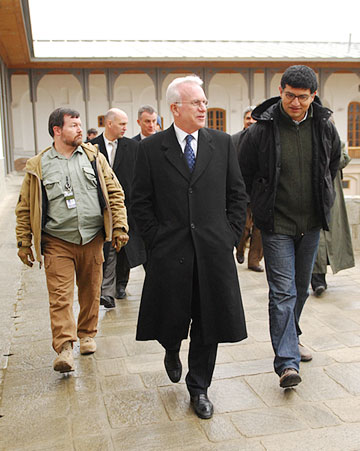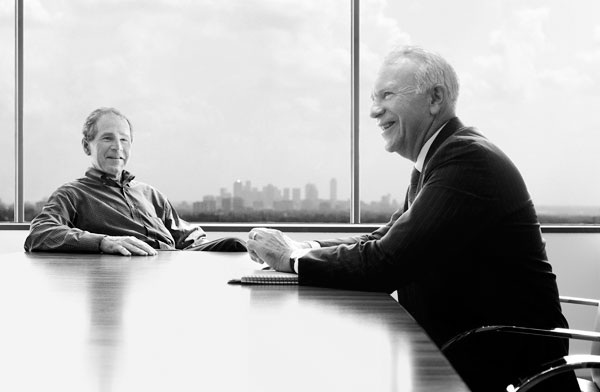His President Bush impression is pretty good. It’s not exactly Will Ferrell’s smarmy, cockeyed, dumb-guy Bush, and not quite Jon Stewart’s hunch-shouldered, “heh-heh-heh” dumb-guy Bush. But, still, when Jim Glassman scrunches his face and does his best West Texas drawl, he’s convincing and funny. And, yet, somehow he’s also respectful.
That makes sense. For one thing, Glassman, a longtime journalist-turned-political appointee, is doing his not-ready-for-prime-time impression while standing in the middle of the Rotunda Room atop the Ronald Reagan building in downtown Washington, D.C., surrounded by mostly Republican-leaning people who have come for the launch of his newest media endeavor, the roundtable show Ideas in Action with Jim Glassman, which airs on PBS stations. For another thing, Glassman once worked in Bush’s administration, succeeding Karen Hughes—who is standing right next to him in the Rotunda Room—as under secretary of state for public affairs and public diplomacy. And for still another thing, Glassman is currently employed by Bush. More or less. Last year, Glassman was named the founding executive director of the George W. Bush Institute, an “action-oriented” think tank that’s one part of the $300 million George W. Bush Presidential Center, which held its formal groundbreaking in mid-November. As such, Glassman is now honor bound—and perhaps contractually obligated—not to make Bush look like a dumb guy.
But here’s the funny thing: Glassman might not want to make Dallas’ most famous resident look bad, but he’s also not trying to make Bush look good.
“That is absolutely not my job,” Glassman tells me. “My job is not legacy building. I’m not burnishing anybody’s reputation.”
To critics who have feared the Bush Institute would turn out to be little more than a source of revisionist propaganda for the historically unpopular Bush administration, that statement might be a source of comfort. But perhaps it shouldn’t be. Although it won’t have a formal home for three years, the Bush Institute under Glassman is already helping to develop and implement new public programs at the local, state, federal, and even international levels. No other postpresidential institution has ever sought that level of active influence. To succeed, Glassman insists that the Bush Institute must be nonpartisan. It must, he figures, create coalitions of academics and professionals—government or otherwise—who can come to a consensus on new public policies and implement them. But if the Bush Institute does indeed manage to bring together nonpartisan, cooperative cadres that can solve major problems in education, global health, the economy, and human rights, then, well—wow. Wouldn’t that be an impressive achievement? Wouldn’t that be, essentially, what President Bush and every other president before him has promised to do? And if the Bush Institute does succeed in implementing these nonpartisan solutions, wouldn’t that, in turn, burnish President Bush’s legacy? It sure would.

Like it or not, Jim Glassman has entered the legacy-burnishing business. It’s hardly the first new field for the 63-year-old native of Washington, D.C., who attended Sidwell Friends School growing up, graduating the same year as Al Gore. Though Glassman primarily identifies himself as a journalist, he’s not your typical ink-stained wretch. He moved around among numerous publications, including a stint writing articles on Europe at the Atlantic Monthly to the founder of an alternative weekly called Figaro in New Orleans to the executive editor of Washingtonian to publisher of the New Republic. Glassman was also the moderator of CNN’s Capital Gang Sunday from 1995 to 1998 and wrote a couple of books, including the embarrassingly titled Dow 36,000 (co-written by Kevin A. Hassett).
He exited full-time journalism in 2000 to serve as one of the founders of Tech Central Station, an online publication that was part journalistic endeavor, part lobbying effort for major companies. Political appointments followed, culminating in June 2008 when Glassman was confirmed by the Senate to take over Hughes’ job at the State Department. Count it all up and Glassman has changed jobs roughly once every few years for the entirety of his career. “I like creating things or starting things or reviving things,” Glassman says. “I get a little bit bored when everything is up and running.”
You’d think someone with that résumé would have an office crammed with memorabilia. And you’d be wrong. Glassman’s current office—the de facto headquarters of the Bush Institute until the George W. Bush Center is open to the public in 2013—is a sparsely decorated, two-person space in Washington, D.C.’s West End neighborhood. A copy of Figaro hangs on the wall. So, too, the New Republic and a couple of other publications. His one bookshelf has much room to spare. His blond wood floor gleams with plenty of open space. The guy is like George Clooney in Up in the Air—very little stuff to put in his imaginary backpack.
There is one important thing, though, that Glassman does carry with him between stints in journalism and the public sector. “I describe myself as being very broad and not all that deep,” he says. “The most important asset of a journalist is being curious about a wide variety of things, including things you have to get up to speed on very quickly. And you have to have an ability to explain complicated ideas in very simple terms. And I think that’s similar to what people in the public policy world require.”
Indeed, even during the year he spent in the Bush administration, Glassman’s role was all about communicating. As Bush’s “international” PR czar, he had to try to explain the principles behind American foreign policy to allies and enemies alike. During his confirmation hearings, he told the Senate that the key to that job was not just offering clarity but also being honest. “We live in a world in which people are very sophisticated,” Glassman said. “They have numerous sources of information. If we tell them lies, they’re going to figure that out pretty quickly.”
Of course, from the day it was announced, some have feared the Bush Institute might not be truthful about Bush’s unpopular presidency. And one of the most outspoken opponents of the center in Dallas, the Reverend William K. McElvaney, a professor emeritus at SMU, seems unconvinced that the Bush Institute is being entirely truthful so far. “Just because they say they are nonpartisan doesn’t make them nonpartisan,” says McElvaney, whose connection to SMU includes a dorm named for his late father. “They are obviously partisan.”
The first time Glassman and I meet, on a warm April day in Washington, he tells me that he’s well aware of the partisan criticisms. But he says the four conferences he has just completed are proof that the Bush Institute takes an independent approach. For instance, Melanne Verveer, the State Department’s ambassador-at-large for global women’s issues and a close colleague of Secretary Hillary Clinton, agreed to speak at the institute’s conference on the plight of Afghan women, where Laura Bush also spoke. And at the institute’s conference on natural gas development, Pennsylvania Governor Ed Rendell, a Democrat, was the highest-ranking politician in attendance besides President Bush. “We have made every effort for people to not perceive the Bush Institute as being political or partisan,” Glassman says. “This is not a partisan institution, and it is absolutely not a political institution. This is a serious intellectual endeavor, and we are hiring serious intellectuals for it.”
Those words read strident. Defensive, even. But in person, Glassman delivers them in a relaxed, deep voice. He sounds, oddly, like Tim Gunn of Project Runway. Without the lisp. Odder still: Glassman also shares Gunn’s gray hair, lean build, and dapper style. (Though one imagines that Glassman—married, Republican, father, and grandfather—may have more political differences with Gunn than political similarities.) On our first meeting, Glassman is in a natty tweed coat. Months later, over lunch at a tony restaurant near his office, he’s dressed in a perfectly tailored navy suit.
“My dad loves clothes and has a great sense for fashion,” says Kate Bennett, Glassman’s daughter, who, as the editor in chief of Capitol File magazine, is something of an expert on fashion. Bennett also tells me that her father is “basically a libertarian.” Technically, Glassman is a registered Republican, and he’s written in favor of the war in Iraq and in opposition to a plethora of taxes. But this is no Dick Armey.
“I don’t want to be immodest,” Glassman says, “but I think people see me as someone who is not partisan. I am a Republican and I served in a Republican administration, but I have always worked across the aisle.”
Even McElvaney has praised Glassman’s reputation. Well, a little. “Glassman is a respected, conservative, academic scholar, and so it doesn’t appear, on the surface, that you have a Karl Rove kind of partisan,” McElvaney says. “Although, who knows what kind of consultation goes on in the back rooms?”

So, Jim Glassman is a smooth-talking journalist/political appointee/think tank director with a reputation for playing nice in Washington and for wearing nice suits. Does that mean Democrats or Libertarians or independents or whoever will want to work with him? Maybe. Glassman has already brought aboard James Guthrie, who spent almost three decades at leftie-friendly Berkeley, to be senior fellow and director of education policy studies. And he expects more such apolitical appointments will be announced as the Bush Institute becomes even more active than it already is.
The Bush Institute’s first real initiative, the Alliance to Reform Education Leadership, was just launched in September. Already in place in the Dallas, Fort Worth, and Plano school districts, the plan is representative of what the Bush Institute hopes to do differently than other think tanks.
“A normal think tank might do a study on Social Security reform, maybe testify about it in Congress, maybe have a conference about it,” Glassman says. “But you can’t start your own Social Security system, so nothing is going to happen unless Congress says yes to your think tank’s idea. We didn’t want to have an institute where we were dependent on the political system to say yes or no to our ideas. We wanted to actually put them into action ourselves.”
With the Alliance to Reform Education Leadership, that guiding philosophy plays out like this: the Bush Institute wants to improve performance among the nation’s principals. So it teams with university scholars and local school districts to develop training and certification programs. Then it begins implementing those programs and measuring their effectiveness. The objective is to train and certify 50,000 public school principals in this way by 2020. And the hope is that the plan will give the principals improved management skills and broader powers over personnel and budgets. That requires the participation of school districts, which are, of course, political entities. But enacting the plan does not require statewide or national legislation.
And maybe, for now, that’s a good thing. Because, as opponents have said from the beginning, there’s a downside to sticking the name of an unpopular commander in chief on your think tank. Then again, there’s also an upside. “Even an unpopular former president has influence,” says Bruce Fenton, president and founder of Boston-based investment firm Atlantic Financial.
True, memories do fade. But second acts also happen, even for presidents. Yes, Bill Clinton was impeached. But his Clinton Global Initiative has helped raise billions of dollars for those in need all over the world. Plus, he got Laura Ling and Euna Lee out of that North Korean prison. And Jimmy Carter’s economic policies were clearly misguided. But the Carter Center has also aided the poor all over the world. Plus, do you know anyone who has hung more drywall in Habitat for Humanity homes than Jimmy Carter? These second acts don’t erase presidential missteps. But they do count.
“Our job is not to defend President Bush’s legacy,” Glassman says. “Our job is to extend what has gone before and also focus on areas that President and Mrs. Bush are passionate about.”
That means the Bush Institute is working in areas where Bush had his biggest successes. Education, for instance. The recent principals initiative shares the theme of accountability with Bush’s No Child Left Behind legislation. The Bush Institute is also working with Mark Dybul, who pushed the president’s Emergency Plan for AIDS Relief, on a project that will deliver comprehensive health services in four African countries to women who are pregnant. These seem like logical next steps, what Bush might have done had he had more time in office or more leverage in Congress. They are the kinds of ideas that form a legacy.
But Glassman is resolute in his belief that he cannot be in the business of “changing the way people think about President Bush.” Pursuing that end, he says, is self-defeating.
“People would see right through that,” Glassman says. “Now, some people probably will change the way they think about President Bush based on what the institute does. But achieving that is simply not in our mission statement.”
Write to [email protected].






